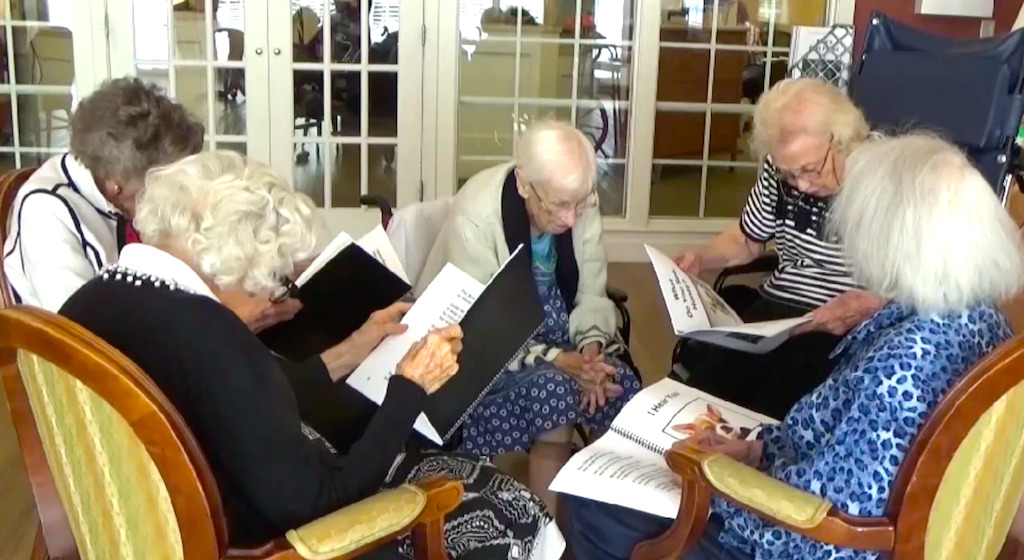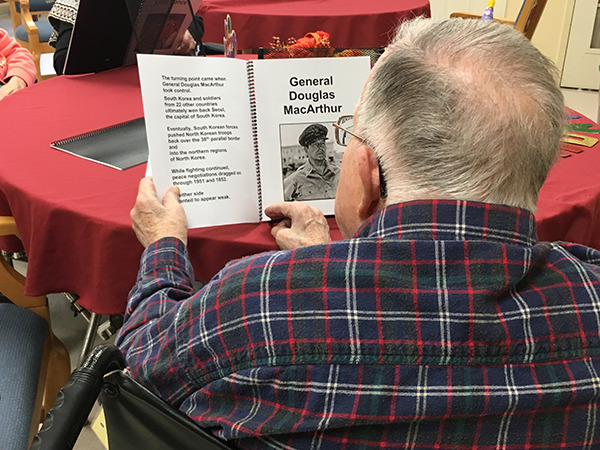
Susan Ostrowski, MA, MS, CCC-SLP
Co-Creator and President, Reading2Connect®
A skilled nursing resident hovering over a book, reading on her own, absorbed. Two skilled nursing residents, nestled close, reading to each other, sharing thoughts. A group of skilled nursing residents, reading, talking, laughing, helping each other find the right page. And all of this without staff member involvement.
Have you seen these scenarios often? Ever? Probably not. But these resident-led experiences occur every day when nursing homes and assisted living communities offer residents reading material that is written specifically for them. That is, books that compensate for acquired cognitive challenges, while at the same time bringing to light residents’ strengths and gifts.
When we think about reading, we think about our eyes moving rapidly down a page full of text. We think of reading as solitary and quiet. If we hold to this rather rigid concept of reading, we assume that people living with dementia can no longer read. The material is too complex, too dense, too small, too long. We chock it up as another lost skill. We move on.
And therein lies the tragedy. Because, in fact, most people living with dementia can read to some functional degree. They perhaps can no longer read typical newspapers, magazines, and books, but that does not mean their reading ability is completely gone. For someone living with dementia, the choices need not be this: either you read a typical book, or you never read again.
In the U.S., we adapt written language for different purposes. Here are four kinds of altered text:
- Beginning Reader text for young children
- English Language Learners text for adults learning English
- Plain Language text for the general population to understand official documents
- Easy Read text for individuals living with developmental and intellectual disabilities
These writing styles are not appropriate for older adults living with cognitive changes for three reasons:
- Elders’ barriers to reading are unique and numerous (e.g., difficulties in simultaneous processing, eye muscle control, selective attention, manual dexterity, light perception).
- Elders have a depth and richness of stored word knowledge, cultural awareness, and life experience.
- Elders have been reading essentially for a lifetime.
So, we come to an exciting challenge. How do we present reading material that is modified for ease of reading, while, at the same time, recognizing this readership’s intelligence and celebrating their experiential wisdom? Books for people living with cognitive decline must incorporate modifications in syntax, graphic layout, lineation, images, and many other features.
 Also, the material must — absolutely must — be age-appropriate in content, style, and appearance. Content that is over-simplistic, dry, boring — or worse — juvenile is degrading to older adults. Plus, they won’t read it; like any of us, they recognize insipid content when they see it.
Also, the material must — absolutely must — be age-appropriate in content, style, and appearance. Content that is over-simplistic, dry, boring — or worse — juvenile is degrading to older adults. Plus, they won’t read it; like any of us, they recognize insipid content when they see it.
UNESCO proclaims, “Reading is a democratic, human right, and necessity to quality of life.” The International Publisher’s Association states, “Reading is crucial for an individual’s personal development and their focus on the outside world and on other people.” In light of these perspectives, I argue that the experience of reading — with whatever adaptations are appropriate — becomes increasingly important in our later years. As our bodies age, nurturing the world of ideas and imagination can take on a greater value. Human beings’ innate curiosity, desire to learn, and need to grow are rarely nurtured in long-term care environments. Reading can do this.
And here’s a bonus! Accessible reading, with abundant images, gets people talking. The text/images serve as manageable scaffolding for authentic commentary, insight, and remembrance with their peers and others. Unlike the fleeting nature of spoken language, adapted text is patient. Elder readers can linger and take all the time they need to comprehend and contemplate the words on the page. Accessible reading stimulates and supports genuine, spontaneous personal expression that we would not hear otherwise.
It is the responsibility of younger generations to make sure that the elements that feed our souls are not stripped away from the aging experience. Those elements may include plants, gardens, art, music, children, pets, birds, community service, etc. Books should be at the top of this list.
Not providing prescription eyeglasses or a mobility device or a pressure relief mattress to folks who need them is neglect. I believe not providing books that are accessible, meaningful, and enjoyable could be seen in the same light. A radical notion, I know. But elder care desperately needs radical thinking. Our lives depend on it.



Hello
Where can I find books like this?
I love this! I’ve been looking for appropriate material to start a reading club within our ‘house’ of 15 Elders. Where can I find these ‘appropriate’ books?
Hi Susan,
This is wonderful in many ways. I appreciate that you are focusing on abilities and not assuming what people can and can no longer do. I agree that reading and connecting in meaningful ways is a human right and can promote social, cognitive and emotional well-being! I was listening to John Zeisel speak on this topic at a recently conference—and I am applauding your meaningful work in this world.
Thank you!
Hi Michelle,
That’s what our work boils down to, right? To shift the doomsday paradigm. I heard Dr. Zeisel as well. I applaud anyone who is working to bring appropriate reading material to people living with cognitive changes!
I COULD NOT AGREE MORE with this article. I have dementia and look forward to reading the local newspaper every day. I try to find articles with subjects I’m interested in. I may not remember all the details of each article, or any details from some articles, but I derive great pleasure while I am reading.
I hear you, S Lewis!
Reading becomes more important than ever when someone is experiencing dementia. It’s like fertilization for the garden of the mind. A work out for the muscle of the imagination, thinking, feeling, believing.
When you sit down to read, you’re taking caring of, respecting, and honoring your mind as it struggles against a disease.
Question: Have you noticed that if you fold up the newspaper so that you are seeing only one article at a time, it helps?
Also, make sure you have REALLY good lighting above and behind. Newspapers have poor visual contrast.
Blessings!
Susan